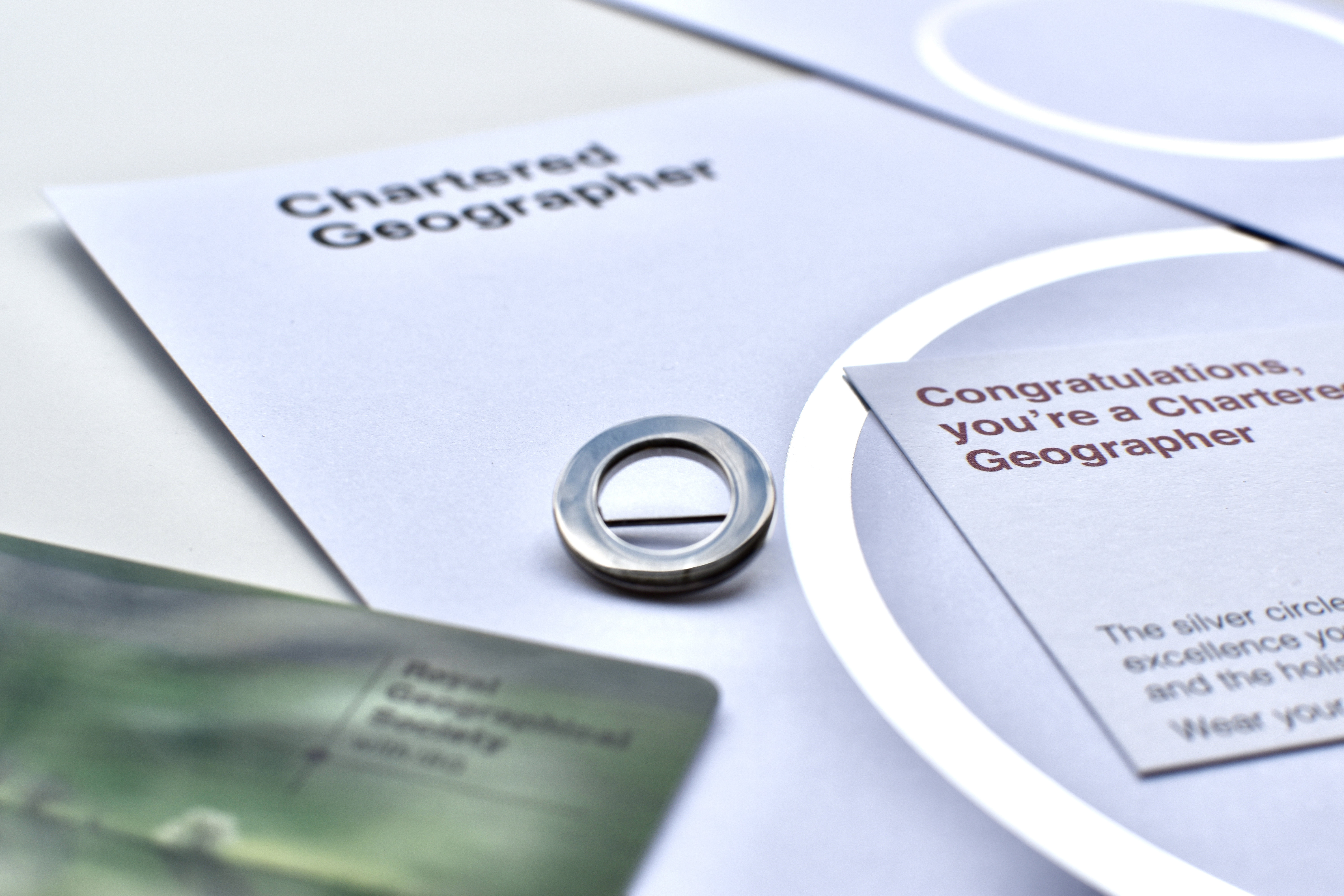
The journey to Chartered Geographer
Find out more about the steps you can take on your journey to accreditation and which will have a big impact on your application.
Accreditation - Chartership - is a key step in your professional development and profile.
If you are unsure whether accreditation is for you, then read about the benefits here.
To support you on this journey, we’ve set out how you can take small steps, which will have a big impact on your application for accreditation.
As well as all the resources here, remember to check for events which will support you professionally, both now and in the future.
Step 1: Seek out a mentor
A mentor may be an invaluable source of advice, guidance and support for you. The most valuable mentoring relationships come when both parties can learn from each other and explore alternative viewpoints and solutions.
Contact the Professional Officer at cgeog@rgs.org to find out more about the mentoring programme for Chartered Geographer.
Once you and your mentor have started to meet regularly, you may find you start to re-tread the same ground. You might find that asking new questions or requesting help to practice a specific skill will help get you both back on track and to unlock new insight and advice. There are more suggestions in our resources below.
We hope that these suggestions will support you in continuing to build an effective relationship with your mentor. If you have any questions, please don’t hesitate to get in touch.
Step 2: Filling gaps in skills and knowledge
As you start to develop the evidence for Chartered Geographer, we encourage you to consult the Chartered Geographer Framework of Competencies in relation to your work, and your current skills and knowledge.
If you haven’t already done a self-assessment of your skill and knowledge gaps, now’s a good time to identify any gaps and set fresh goals to address them. One way to do this is to:
-
Make a list of the competencies you have developed (or have nearly developed), and those that you still need to focus on.
-
Prioritise these, categorising them by high/low priority and high/low difficulty.
-
Make an action plan to address them. Start with the high importance and low difficulty – these are your 'quick wins'. But make sure you also set in motion a plan to address your high importance and high difficulty priorities. Don’t forget that your actions should be SMART.
This process involves a lot of self-reflection and self-organisation, to keep ticking off items on your action plan. It can help to share your action plan with your mentor, who will help sense-check your priorities and ask about progress.
Step 3: Recording Continuing Professional Development
Keeping an accurate and complete record of your CPD now is crucial to a successful application for Chartered Geographer in the future, and supports your long term career development.
Chartered Geographers are expected to complete 35 hours of CPD each year, normally made up of at least 15 hours of CPD completed internally (e.g. offered by your employer), and 20 hours of CPD completed externally (with other organisations).
The Society takes a broad view of the activities that can support professional engagement and development. These may range from formal training courses to on-the-job and self-directed learning, offering or receiving mentoring and coaching, consultancy and expert advice, writing for publication (including online platforms and social media), participating in conferences and workshops, giving presentations and taking part in discussions, and promoting geography and the profession of Chartered Geographer.
The most important section of your CPD log is the reflective statement. This is where you discuss the CPD you completed, its contribution to your professional development, and your plans for the next year. Contact the Professional Officer if you are interested in getting your CPD log reviewed.
The resources below will support you in identifying CPD and recording it effectively. If you have any questions, please don’t hesitate to get in touch.
Step 4: Curating your career CV
As you accrue a range of professional experience, your CV should be kept up to date. Not only will this be useful for job applications, but a showcase of what you have achieved in your career will be necessary for your Chartered Geographer application.
It is good practice to maintain a ‘comprehensive’ CV that you regularly add to over a long period of time. It should include all examples of experiences, skills, competencies and achievements that you might want to highlight. From this ‘comprehensive’ CV, you can then draft ‘tailored’ CVs for specific job applications or accreditation, by removing the less relevant elements and re-writing your personal statement/profile.
Your CV can take any template or format for a Chartered Geographer application and does not have a word limit. It must cover at least the six years of relevant professional experience (or more if you don’t have a geography degree), but ideally include all of your relevant professional career. It should be a factual and detailed record of your work history and achievements, which can be cross-referenced in your Professional impact statement and CPD Record as needed.
The links below will support you in showcasing what you have achieved to date in your career in a concise and appealing way. If you have any questions, please don’t hesitate to get in touch.
Step 5: Getting more out of networking
Networking is an important way to develop professional relationships, where you can help others and receive assistance yourself to meet individual or organisational goals.
By networking and being visible within your communities of professional practice, it is more likely that someone will think of you if a new, exciting opportunity arises. More importantly, it allows an ongoing exchange of ideas, especially if you can expand your network beyond your organisation, sector or profession.
Developing a network that has contacts at many different career stages also allows you to look ahead, to identify goals and aspirations or different pathways for career growth. Draw on the knowledge and experiences of your network as you consider your career plans.
The links below will support you in growing and making use of your professional network. If you have any questions, please don’t hesitate to get in touch.
Step 6: Professional engagement for a professional impact
As you are approaching an application for Chartered Geographer, you should consider how you engage professionally, and how that has an impact for you and others.
A key element of your Chartered Geographer application will be the Professional impact statement (.doc). While your CV and CPD record are factual records of your career progression and professional development, your Professional impact statement should be more reflective, describing how you have applied geographical skills, knowledge, understanding and insight to your work, how these have been enhanced by your professional engagement, and the impact this has had for advancing your own career and geography.
Professional engagement allows your career to grow, by applying your expertise and learning through interaction with other professionals, in both formal and informal ways. It is less about mastery of specific skills or knowledge (which is another important aspect of CPD), and more about sharing those skills and knowledge for mutual benefit and impact.
Our resources below suggest some practical ways to reflect on your career, professional engagement and professional impact, to kick-start your Professional impact statement. If you have any questions, please don’t hesitate to get in touch.
Step 7: Benefitting from your accreditation
As you put together your application for Chartered Geographer, think about the journey you have been on in acquiring, improving and using the wide range of geographical skills, knowledge and understanding your professional life requires. We hope that this journey will have brought both professional and personal benefits, for you and your wider network.
Assessors will want to see evidence of your competency and professionalism across the four themes of the Framework of Competencies, and of your professional engagement and impact in a range of ways. If you haven’t done so already, start making notes on how your work experience, education, professional development and other engagement build your case for Chartered status, ensuring that your examples cross the breadth and depth of the Framework.
We also encourage you to take some time to reflect on what achieving Chartered status will mean to you, and how you might demonstrate your professionalism as a Chartered Geographer in the future – this is a milestone in your professional pathway, not an end point.
If you have any questions as you start to prepare your application, please don’t hesitate to get in touch.
Featured image: Holly Mandarich/Unsplash
Chartered Geographers reflect on the benefits of accreditation
Learn how Chartered Geographers are benefitting from accreditation, in their own words.
